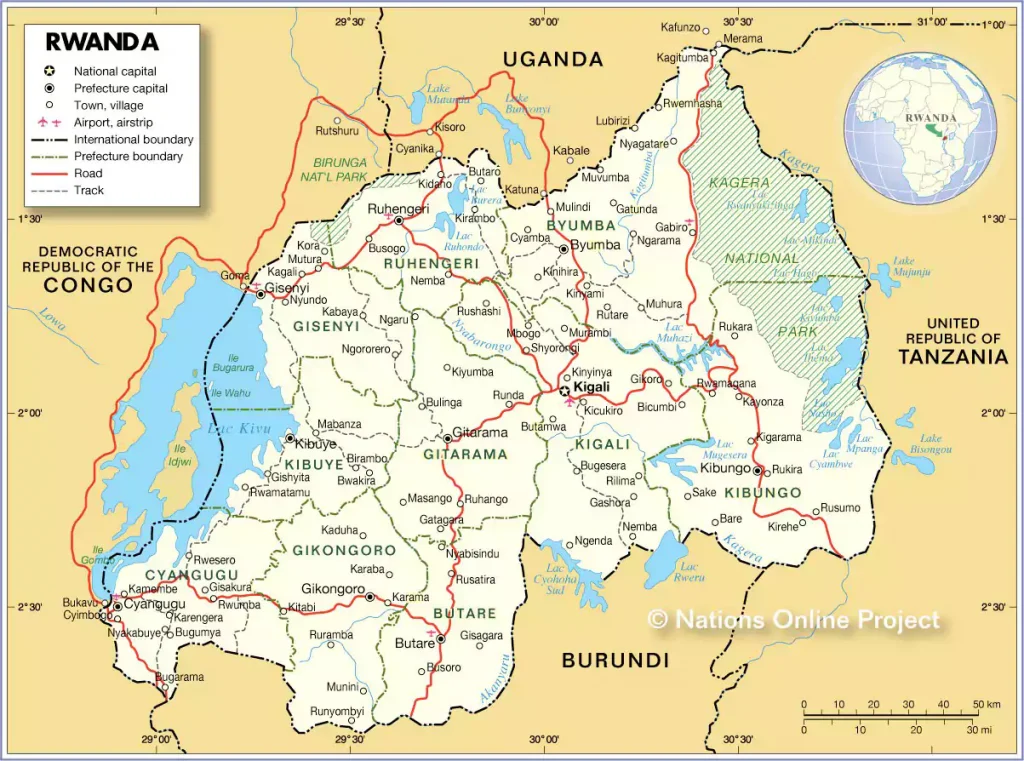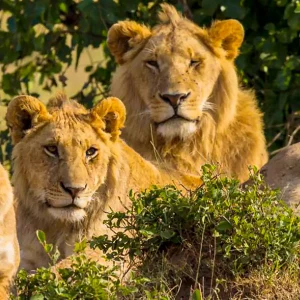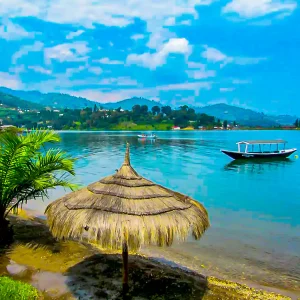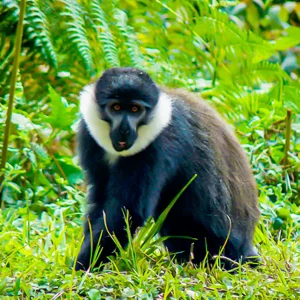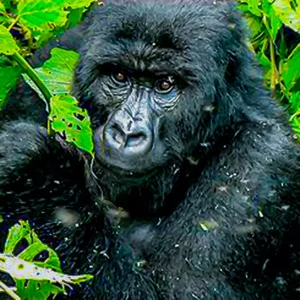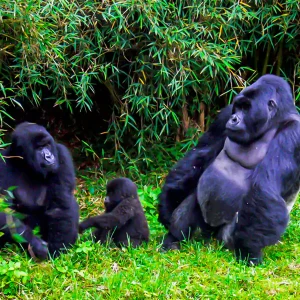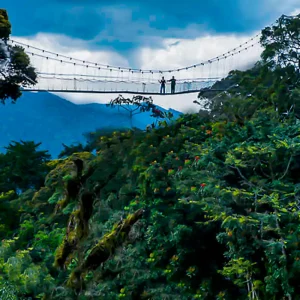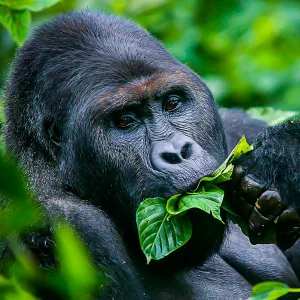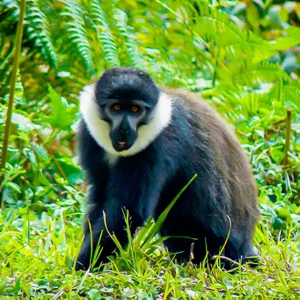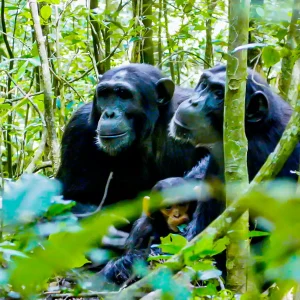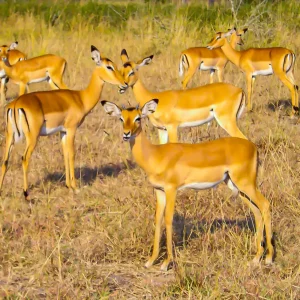- Home
- »
- Rwanda
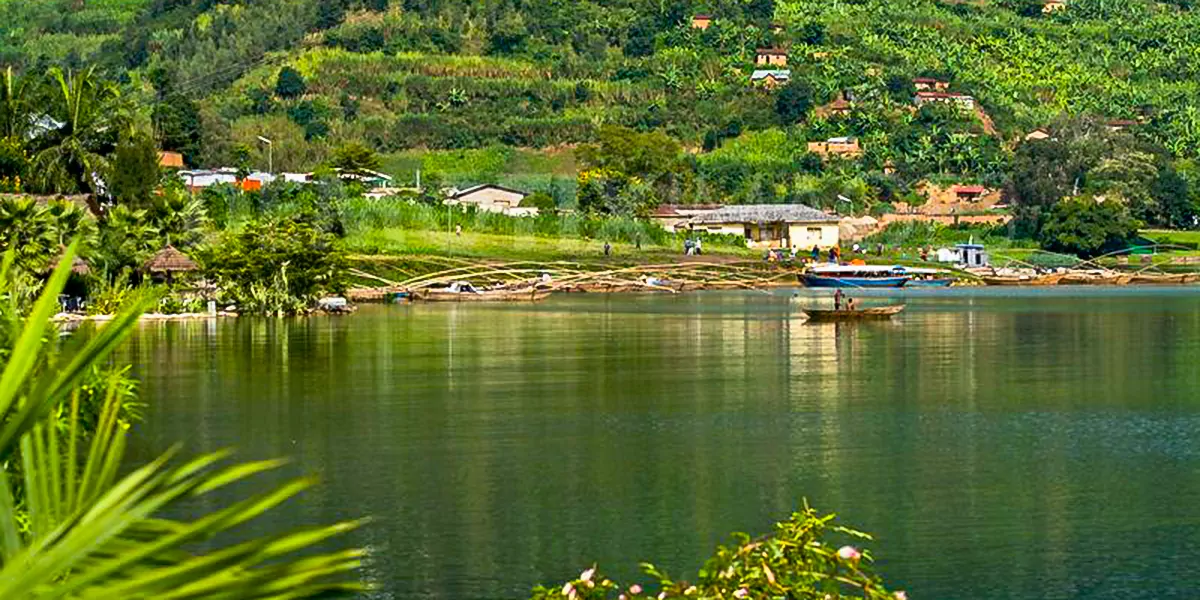
- Home
- »
- Rwanda
RWANDA PARKS & ATTRACTIONS.
Rwanda, “The land of a Thousand Hills”, Rwanda is a green undulating landscape of hills, gardens and tea plantations. It offers tourists a one of a kind journey – home to one third of the world remaining Mountain Gorillas, one third of Africa’s bird species, several species of primates, volcanoes, game reserve, resorts and islands on the expansive lake Kivu, graceful dancers, artistic crafts and friendly people.All of Rwanda is at high elevation, with a geography dominated by mountains in the west, savanna in the east, and numerous lakes throughout the country.
It is also among the interesting and prime destinations of East Africa with its steep mountains and deep valleys which cover most of the country. Lake Kivu in the northwest, at an altitude of 4,829 ft. (1,472 m), is the highest lake in Africa. Extending north of it are the Virunga Mountains, which include the volcano Karisimbi (14,187 ft; 4,324 m), Rwanda’s highest point.
Map
Country facts
Rwanda, officially the Republic of Rwanda (Kinyarwanda: Repubulikay’u Rwanda; French: République du Rwanda), is a sovereign state in central and east Africa. Located a few degrees south of the Equator, Rwanda is bordered by Uganda, Tanzania, Burundi, and the Democratic Republic of the Congo. All of Rwanda is at high elevation, with a geography dominated by mountains in the west, savanna in the east, and numerous lakes throughout the country.
Rwanda is not only the land of a thousand hills, but also a country rich in flora and fauna and stunning natural beauty in its scenic rolling and breathtaking green savanna. The country hosts some rare species of animals like the silverback mountain gorillas as well as unique birds and insects in the tropical forest of Nyungwe. The country is enjoying an increasing number of visitors, whose main interests are the mountain gorilla tracking in the Parc National des Volcans, the primates of Nyungwe Forest and game drives at Akagera National Park.
Expect a warm and friendly welcome to a beautiful country, as well as security advisories.
Capital: Kigali
President: Paul Kagame
Currency: Rwandan franc
Population: 12.20 million (2017) World Bank
Government: Unitary state, Republic
Official languages: French Language, English Language, Kinyarwanda language
National Day: 1st July
Industry: Coffee and Tea factories, Cotton and Textile, Tobacco, plastics, soaps.
Agriculture: Coffee, Tea, pyrethrum.
Climate: Tropical
History
For centuries, Rwanda existed as a centralized monarchy under a succession of Tutsi kings from one clan, who ruled through cattle chiefs, land chiefs and military chiefs. The king was supreme but the rest of the population, Bahutu, Batutsi and Batwa, lived in symbiotic harmony. In 1899, Rwanda became a German colony and, in 1919, the system of indirect rule continued with Rwanda as a mandate territory of the League of Nations, under Belgium. From 1959, Batutsi were targeted, causing hundreds of thousands of deaths and sending almost two million of them into exile. The First Republic, under President GregoireKayibanda, and the second, under President Juvenal Habyarimana, institutionalized discrimination against Batutsi and subjected them to period massacres.
The Rwandese Alliance for National Unity (RANU) was formed in 1979 by Rwandan refugees in exile, to mobilize against divisive politics and genocide ideology, repeated massacres, statelessness and the lack of peaceful political exchange. In 1987, RANU became the Rwandese Patriotic Front (RPF). On 1 October 1990, the RPF launched an armed liberation struggle that ultimately ousted the dictatorship in 1994 and ended the genocide of more than one million Batutsi and massacres of moderate Bahutu who opposed the genocide.
On 4 July 1994, RPF formed a Government of National Unity headed by President Pasteur Bizimungu, bringing parties that did not participate in the genocide together. In 2000, Parliament voted out President Pasteur Bizimungu and RPF appointed then Vice-President and Minister of Defense, Major General Paul Kagame as the President of the Republic to lead the coalition government. In 2003 President Paul Kagame was elected with landslide majority to serve a term of seven years. During those seven years, the country made unprecedented socio-economic and political progress and consolidated peace, stability as well as social cohesion among Rwandans. In 2010, President Paul Kagame was re-elected to serve a second term and on a platform of rapid development for the transformation of the lives of all Rwandans.
Climate
In the heart of Africa, fractionally south of the equator, Rwanda’s relatively high altitude provides it with a remarkably pleasant tropical highland climate, albeit also with plenty of rain. Temperatures vary considerably between locations depending on their altitude, but very little from month to month in the same place. In the capital, Kigali, the average daily temperature is about 21°C.
Rwanda’s long rainy season lasts from about March to May, when the rain is heavy and persistent. Then from June to mid-September is the long dry season; this is generally the best time to visit if you have the choice.
October to November is a shorter rainy season and it’s followed by a short dry season from December to February.
During both of Rwanda’s dry seasons, there is often light cloud cover. This helps to moderate the temperatures, but also occasionally brings light rain showers.
Landscape of Rwanda
Rwanda is a landlocked country situated in central Africa. Also known as ’the land of a thousand hills’, Rwanda has five volcanoes, twenty-three lakes and numerous rivers, some forming the source of the River Nile. The country lies 75 miles south of the equator in the Tropic of Capricorn, 880 miles ’as the crow flies’ west of the Indian Ocean and 1,250 miles east of the Atlantic Ocean – literally in the heart of Africa. Rwanda is bordered by Uganda to the north, Tanzania to the east, Burundi to the south and the democratic republic of Congo to the west.
Anyone visiting ’the land of a thousand hills’ is in for a multitude of surprises. The loveliness and variety of the landscapes in this ’green country’ is dominated to the north by volcanoes and bordered by Lake Kivu to the west. In Rwanda the great animals of the wild are protected from poachers and roam free in the vast national parks. The Volcanoes National park in the Virunga volcanic mountains with its high altitude forests, are world famous for mountain gorillas – timid and passive family oriented giants – which is teeming with wildlife both large and small, while Lake Kivu to the west offers beautiful beaches, jutting peninsula’s and an archipelago of islands.
Reasons to visit Rwanda
There’s magic in the air
Rwanda just has a magical aura to it that you need to experience. It’s the “land of a thousand hills” and it lives up to its name–with mountains beyond mountains. And, through the mountains floats Rwanda’s famed mist. The country has a special spirit to it. I feel at ease in Rwanda–it’s clean, safe, and friendly.
Rwanda has purpose
The country is going places and, if you go there now, you can still say you were there before it was big. Credit is due, largely, to Rwanda’s leadership who, after the genocide, has worked to make the country a better place. President Kagame is particularly focused on making Rwanda the next Switzerland or Singapore. And it shows. The tech industry is growing quickly, the country is wired with fiber optics, and they are attracting big name corporations taking a look at making Rwanda their Africa home base. The streets are clean–they even outlawed plastic bags in country, which are seen littering the sides of the roads in every other country. From economy to environment, Rwanda has targets in every sector and the country is working together to achieve. The overarching goals become a middle-income country by 2020.
You can get my head around Rwanda
Some countries are so large that it’s hard to get a feel for them. I’ve grown up in the U.S., but there are major, diverse regions of my country in which I have yet to set foot. Rwanda, on the other hand, I can drive across in about 4 hours. I’ve been to Volcanoes National Park in the north, the shores of Lake Kivu in the West, and the hills of Butare in the south. I still have a much left to explore and I know I can get there.
Gorillas
This is reason enough to visit Rwanda. There are real mountain gorillas in Rwanda’s forests and you can spend an hour with them–within FEET of them. You drive deep into northern Rwanda, and then hike into the forest guided by gorilla trackers. A gorilla visit can entail anything from a 1 to 4-hour trek through the forest, led by experienced trackers who have spent their entire lives living in or close to the forest. Your trek will be enchanting as you weave through overhanging vines, moss-covered Hagenia trees and giant Lobelias that thrive in the tropical climate. You may spot golden monkeys or see buffalo, bush duiker and a wide variety of bird life.
But the high point, of course, one of the greatest wildlife experiences on earth, will be spending an hour with the gentle giant gorillas as they go about their daily life, feeding, playing, resting, raising their young. At the end of your visit you will understand what kept conservationist Dian Fossey living in this same forest for 18 years protecting these wonderful animals.
Interesting history
Finally, Rwanda is interesting because it has a history worth knowing. The Rwanda Genocide is barely behind us and it’s reality is still ever-present. The Genocide Memorial is a must see for any trip to Africa. Beyond the genocide, it’s sometimes troubled past with colonization and occupation has shaped Rwanda in ways that continue to impact culture and language.
If you are considering an adventure in the near future, Rwanda gets my highest recommendation.
Travel Guide
Air Transportation
There are many international flights to Rwanda. In particular amongst the airlines are SN Brussels, Kenya Airways, Ethiopian Airlines, Air Burundi and Rwanda Air Express. The airport is located 10 Km from central Kigali.
Best Travel Period
Rwanda can be visited throughout the year. Gorilla tracking and other forest walks are less demanding during the drier months. The European winter is the best time for birdwatching, as Palearctic migrants supplement resident species.
Passports and Visas
A valid passport is required by all nationals referred to in the chart above to enter Rwanda. Visas for Rwanda are required by all nationals referred to in the chart above, except:
Nationals of Germany, Sweden, the UK and the USA for stays up to three months, and all travellers require a yellow fever vaccination certificate.
Note: Nationals not referred to in the chart are advised to contact the embassy to check visa requirements for Rwanda.
Visa note:
A single-entry visa on arrival is only available to nationals who do not have a Rwandan embassy or consulate in their country. Those who this applies to should visit www.migration.gov.rw.
Health requirements
A certificate of yellow-fever vaccination is required. Much of Rwanda lies at too high an elevation for malaria to be a major concern, but the disease is present and anti-malaria drugs are strongly recommended. It is advisable not to drink tap water. Bottled mineral water can be bought in all towns.
Currency
The unit of currency is the Rwanda Franc (RFr). The US dollar is the hard currency of preference. It may be impossible to exchange travellers’ cheques away from the capital. Credit cards are usually only accepted at the major hotels in Kigali .
Language
In addition to the indigenous language of Kinyarwanda, French and English are official languages. French is widely spoken throughout the country. In the capital and other tourist centers, many people speak English.
Dress code
It is advisable to bring light and practical clothes, supplemented by light sweaters for the cool evenings and heavier clothing for the Parc des Volcans and Nyungwe. While tracking gorillas, wear solid walking shoes and sturdier clothing to protect against stinging nettles. A water proof rain jacket is important.
Transportation and communication
Rwanda has an excellent cell phone network covering almost the entire country. International phone calls can be made easily. Appropriate SIM cards for the network are readily available everywhere, even in remote towns, and cell phones can be purchased or rented from major shops in Kigali. Most towns of any size will have several Internet cafes and computer center.
Roads
All of the major centers are connected with good road infrastructure. The fine road network, with little traffic, offers wonderful opportunities for long bicycle trips across the verdant hills and valleys. Mountain biking and hiking can be enjoyed on the thousands of kilometers of fine rural trails linking remote villages, crossing the entire country.
Gorilla permits
Gorilla Permits can be arranged by a local Tour operator, or can be purchased directly through the Office-The Rwanda Tourism Board, at the headquarters in Kigali, or at their office in Ruhengeri.
Rwanda is one of the most biologically diverse countries in Africa and home to a variety of wildlife including lions, elephants, leopards, and buffalo. However, what makes Rwanda safaris truly unique is the opportunity to track gorillas in their natural habitat. Visitors can hike through the jungle with experienced guides in search of these majestic animals. And while sightings are never guaranteed, the experience of being in the presence of a wild gorilla is unforgettable. For those looking for an even more intimate encounter, Rwanda also offers the opportunity to stay overnight in a remote village with a local family. Here, visitors can learn about traditional Rwandan culture and catch a glimpse of everyday life. Whether you’re looking for adventure or cultural enrichment, Rwanda safaris offer something truly unique.

